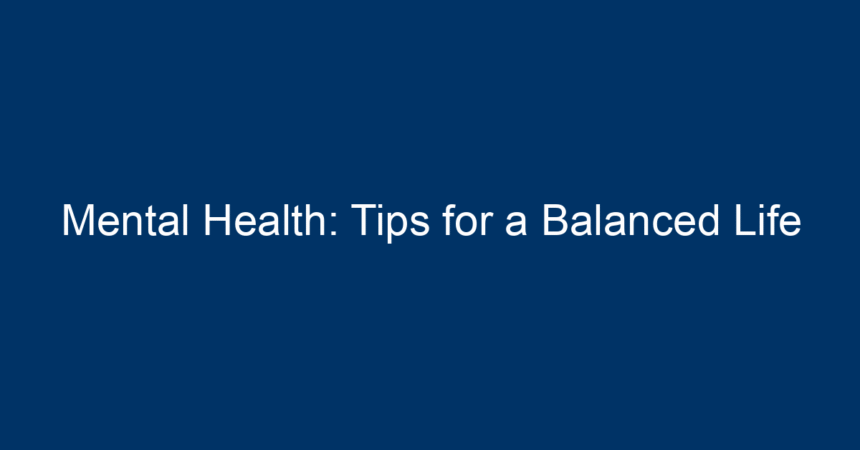In today’s fast-paced world, maintaining mental health can often feel like an uphill battle. With the pressures of work, family, and social commitments, it’s easy to neglect our mental wellbeing. However, prioritizing mental health is crucial not just for personal happiness but also for fostering healthier relationships and a more productive life. In this comprehensive guide, we’ll explore practical tips and strategies to help you achieve a balanced life, enhancing your overall mental health.
Understanding Mental Health
Mental health encompasses our emotional, psychological, and social well-being. It affects how we think, feel, and act, influencing how we handle stress, relate to others, and make choices. The World Health Organization defines mental health as “a state of well-being in which every individual realizes his or her own potential can cope with the normal stresses of life, can work productively and fruitfully, and is able to contribute to his or her community.”
The Importance of Mental Health
Maintaining good mental health is essential for several reasons:
- Improved Quality of Life: Good mental health fosters happiness and satisfaction across various life domains.
- Enhanced Productivity: A balanced mindset helps individuals perform better at work and prioritize effectively.
- Stronger Relationships: Being mentally healthy allows for better communication and connection with others, reducing the likelihood of conflicts.
- Increased Resilience: Good mental health equips individuals to handle challenges and setbacks more effectively.
Tips for Achieving a Balanced Life
Creating balance in your life is a continuous process that involves various aspects. Here are actionable tips to enhance your mental health:
1. Prioritize Self-Care
Self-care is critical for maintaining mental health. Here are some self-care practices to consider:
- Physical Activity: Regular exercise releases endorphins, boosting your mood and reducing anxiety. Aim for at least 30 minutes of moderate exercise most days of the week.
- Healthy Eating: Nourish your body with a balanced diet rich in fruits, vegetables, whole grains, and lean proteins. Foods like fatty fish, nuts, and leafy greens are especially beneficial for brain health.
- Adequate Sleep: Aim for 7-9 hours of quality sleep each night. Sleep is vital for cognitive function, emotional regulation, and overall health.
2. Establish a Routine
A structured daily routine can provide a sense of normalcy and predictability:
- Set Specific Goals: Identify short-term and long-term goals to give your life direction. Whether they’re related to your career, personal growth, or hobbies, goals help establish a purpose.
- Plan Your Days: Use a planner to map out your daily tasks and prioritize activities that contribute to your well-being. Make time for work, play, and relaxation.
3. Cultivate Mindfulness
Mindfulness practices can significantly improve mental health:
- Meditation: Spend a few minutes each day meditating. Focus on your breath and allow thoughts to come and go without judgment.
- Journaling: Writing about your thoughts and feelings can provide clarity and reduce stress. Aim to journal regularly, reflecting on your experiences and emotions.
4. Foster Meaningful Relationships
Social connections play a pivotal role in promoting mental health:
- Stay Connected: Maintain relationships with friends and family. Regular communication can provide emotional support and a sense of belonging.
- Join Support Groups: Consider joining clubs or support groups that align with your interests. Sharing experiences with others who understand can be therapeutic.
5. Manage Stress Effectively
Developing stress management techniques is essential for maintaining mental health:
- Deep Breathing: Practice deep breathing exercises to calm your mind during stressful situations. Inhale deeply through your nose, hold for a few seconds, then exhale slowly.
- Time Management: Break tasks into manageable chunks. Prioritize urgent tasks and give yourself breaks to avoid burnout.
6. Seek Professional Help When Needed
Don’t hesitate to seek help if you’re struggling with your mental health:
- Therapy: Speaking to a therapist can provide you with tools to manage your emotions effectively. Cognitive-behavioral therapy (CBT) is particularly effective for anxiety and depression.
- Support Services: Many communities offer mental health services aimed at reducing stigma and providing resources. Look for local support networks.
7. Limit Screen Time
In our digital age, excessive screen time can negatively impact mental health:
- Set Boundaries: Limit time spent on social media and engage in non-screen-related activities, such as reading or outdoor activities.
- Digital Detox: Consider unplugging for a day or weekend. Use this time to reconnect with nature, yourself, and loved ones.
8. Practice Gratitude
Gratitude is a powerful tool for enhancing mental health:
- Gratitude Journals: Keep a journal to jot down things you are grateful for each day. This practice can shift your focus from negativity to positivity.
- Express Appreciation: Tell others what you appreciate about them. It can strengthen relationships and lift your spirits.
Conclusion: Taking Action for Better Mental Health
Achieving a balanced life and good mental health is a continuous journey that involves intentional effort and self-reflection. By incorporating self-care practices, establishing routines, fostering relationships, and managing stress, you can create a fulfilling and enjoyable life. Remember, it’s okay to seek help when needed; professional support can be invaluable on your journey to mental wellness.
Taking proactive steps towards enhancing your mental health can lead to a happier, more balanced life. Start today by implementing these tips, and don’t forget to celebrate your progress along the way. Prioritize yourself, and you’ll discover that a balanced life is not just a dream—it’s within your reach!




